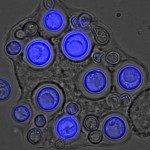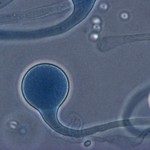Lien vers Pubmed [PMID] – 33706012
Lien DOI – S1525-1578(21)00061-110.1016/j.jmoldx.2021.02.007
J Mol Diagn 2021 Mar; ():
Laboratory diagnosis of histoplasmosis is based on various methods, including microscopy, culture, antigen, and DNA detection of Histoplasma capsulatum var. capsulatum or Histoplasma capsulatum var. duboisii. To improve sensitivity of existing real-time quantitative PCR (qPCR) assays, we developed a new RT-qPCR assay that allows amplification of whole nucleic acids of Histoplasma spp. validated on suspected cases. The limit of detection was 20 copies, and the specificity against 114 fungal isolates/species was restricted to Histoplasma spp.. Whole nucleic acids of 1319 prospectively collected consecutive samples from 907 patients suspected of having histoplasmosis were tested routinely between May 2015 and May 2019 in parallel with standard diagnostic procedures performed in parallel. Forty-four had proven histoplasmosis attributable to H. capsulatum var. capsulatum (n = 40) or H. capsulatum var. duboisii (n = 4) infections. The results of RT-qPCR were positive in 43 of 44 patients (97.7% sensitivity) in at least one specimen. Nine of 863 cases (99% specificity) were RT-qPCR positive and therefore classified as possible cases. RT-qPCR was positive in 13 of 30 (43.3%) blood samples tested in proven cases. A positive RT-qPCR result in blood was significantly associated with H. capsulatum var. capsulatum progressively disseminated histoplasmosis with a positive RT-qPCR result in 92.3% of the immunocompromised patients with disseminated disease. This new Histoplasma RT-qPCR assay enabling amplification of H. capsulatum var. capsulatum and H. capsulatum var. duboisii is highly sensitive and allows the diagnosis of histoplasmosis advantageously from blood and bronchoalveolar lavage.









